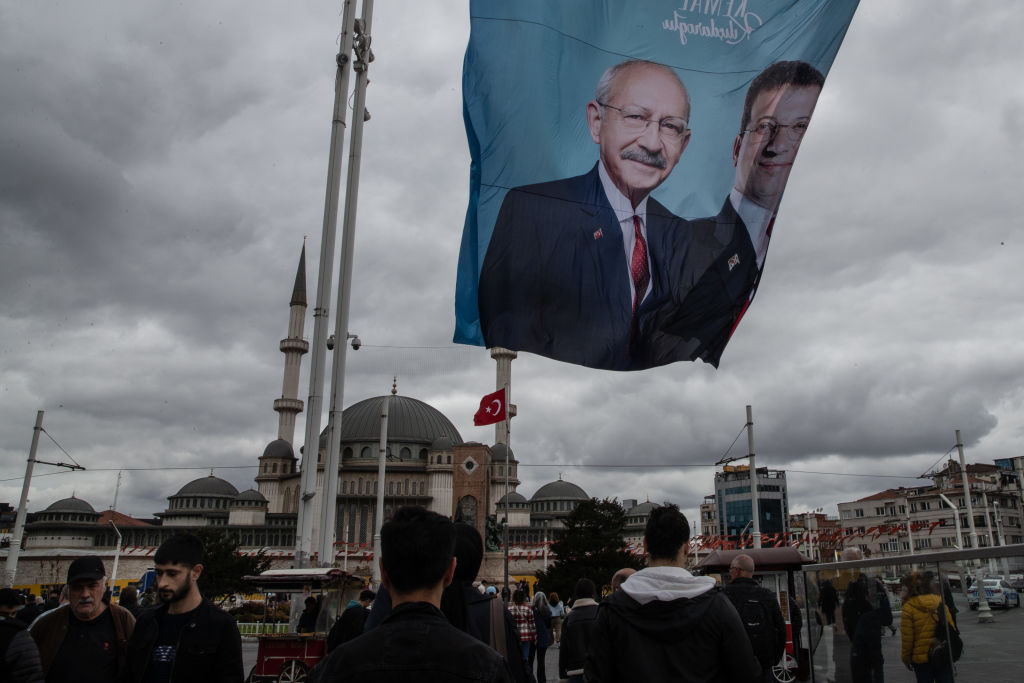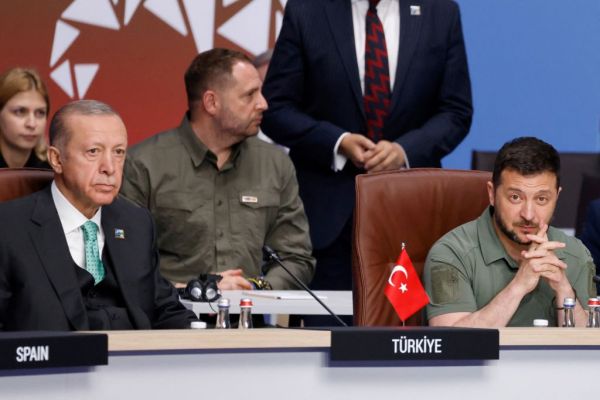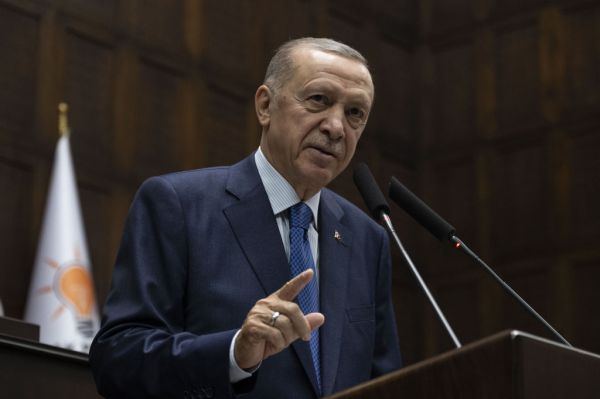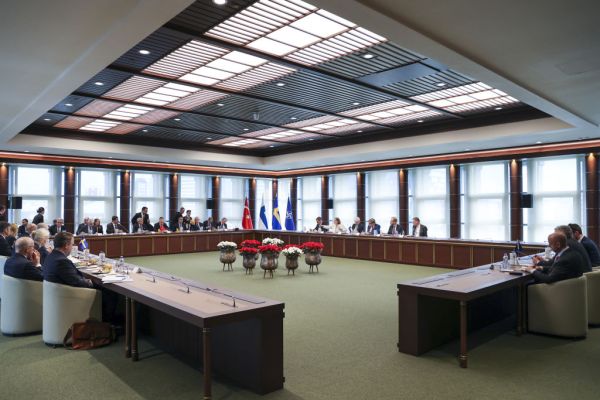ISTANBUL—Millions of Turkish voters will cast ballots Sunday to either end or extend President Recep Tayyip Erdoğan’s two-decade rule. His rivals are banking on Turkey’s economic disrepair, corruption, and authoritarian lurch to win over supporters, while Erdoğan is fanning old grievances—including against the United States and its allies—to hold onto power.
“We need to teach America a lesson,” Erdoğan said recently, calling on his base to vote by doubling down on a claim that the United States is backing his rival, Republican People’s Party (CHP) head Kemal Kılıçdaroğlu.
Turkish Interior Minister Süleyman Soylu took the accusations of American meddling a step further during a campaign event last month, charging the West with plotting to overthrow Erdoğan via the election. “July 15 was their actual coup attempt,” Soylu said in reference to Turkey’s failed military putsch in July 2016, which he and other government officials have baselessly blamed on the U.S. “And May 14 is their political coup attempt. It is a coup attempt that can be formed by bringing together all preparations to eliminate Turkey.”
Binali Yıldırım, Turkey’s former prime minister and a failed Istanbul mayoral candidate for Erdoğan’s Justice and Development Party (AKP), warned this week of election interference by America, Europe, “devils,” and other alleged foes.
Attacking the vote’s legitimacy—despite the power the president and his allies wield over the electoral system—raises concerns they may be laying the groundwork to contest a defeat. But blaming nefarious forces for Turkey’s hardships has been one of Erdoğan’s oft-used tactics in his more than 20 years at the country’s helm.
The president learned he could turn persecution into a political currency early in his career. In 1997 Erdoğan—then-mayor of Istanbul—was removed from office, barred from politics, and imprisoned for four months after reciting an incendiary poem at a rally. Not long after his release he founded the AKP, which swept parliament in its first elections in 2002.
The lifting of Erdoğan’s political ban allowed him to join national politics in 2003, marketing himself as a modest reformer seeking to safeguard Islam and revitalize the Turkish economy. He notched early victories with voters through infrastructure projects and generous welfare programs. But as his star rose, so did his mistrust of Turkey’s Western allies. Beginning in earnest with a wave of anti-government protests in 2013, Erdoğan began suspecting America of trying to covertly sideline Turkey as a world power. The U.S. was waging “economic war” on Turkey, he once claimed. “The goal is to bring to heel Turkey and the Turkish nation, to hold it captive.”
A spate of terrorist attacks beginning in 2015 and the failed 2016 coup exacerbated his paranoia. On July 15, 2016, amid instability wrought by the bombings and an influx of Syrian refugees, the president narrowly escaped an ouster after the military clashed with Erdoğan devotees in cities across Turkey. The attempted overthrow injured thousands and left hundreds—more than half of them civilians—dead. Since then Erdoğan has rooted out rivals and solidified his power: In 2017 his allies in parliament dissolved Turkey’s premiership via constitutional referendum to make him the country’s sole executive.
Returning to the site of his dramatic reemergence following the failed coup, Erdoğan went on the offensive Sunday in Istanbul. Speaking to a massive crowd at the retired Atatürk Airport, Erdoğan accused the six-party opposition alliance behind Kılıçdaroğlu—which includes liberals, conservatives, Islamists, and nationalists—of colluding with terrorists and receiving support from the man the AKP claims was behind the coup, Fethullah Gülen. A one-time Erdoğan ally, Gülen now lives in Pennsylvania and has been at the center of Washington’s deteriorating ties with Ankara after subsequent American administrations have declined to extradite him back to Turkey to face trial.
Another sticking point in U.S.-Turkish relations—and Erdoğan line of attack in the election—is the Kurdish question. The president and his government have long charged the U.S. with sponsoring terrorism through its support for Kurdish groups fighting in Syria, which they claim are aligned with Turkey’s Kurdistan Workers Party (PKK), the militant group behind many of the attacks on Turkish civilians. Because Kılıçdaroğlu appears poised to win much of the Kurdish vote, Erdoğan has also accused the Turkish opposition—without evidence—of walking “shoulder-to-shoulder” with the PKK.
Kılıçdaroğlu has taken a different campaign approach. At an Istanbul rally on Saturday, the 74-year-old bespectacled former bureaucrat, not mentioning Erdoğan by name or sowing conspiratorial thinking, focused on the realities of Turkish suffering under the current system.
“We are all thirsty for justice, we all want justice. Justice doesn’t just happen in courtrooms. If a child goes to bed hungry, 85 million people are hungry. If a child sleeps in the cold, it means 85 million are in the cold. All of Turkey’s problems can be solved. I have no interest in the palace. I live like you. I have a modest life like you,” Kılıçdaroğlu said, casting himself as the Everyman in contrast to Erdoğan and his billion-dollar presidential complex.
“Bread-and-butter issues are important,” said Aslı Aydıntaşbaş, a visiting fellow at the Brookings Institution, pointing to the cost-of-living crisis facing Turkey. The opposition has “made a very persuasive argument that the one-man regime, essentially, is a recipe for economic disaster,” she added. “It’s a dysfunctional, unhealthy way of running a state.”
Erdoğan’s rivals have also convinced many voters that Sunday’s vote could be their best and last chance to unseat the entrenched leader as he exercises more control over both civil society and the levers of state power.
In the midst of its most consequential presidential race in decades, tensions are already starting to boil over across Turkey, sparking fears about what Election Day may look like.
During a campaign event in the eastern city of Erzurum on Sunday, AKP supporters hurled rocks at the bus of Istanbul Mayor Ekrem Imamoğlu, Kılıçdaroğlu’s vice presidential candidate. Kılıçdaroğlu in response urged his supporters to stay calm in the lead-up to the vote, and refrain from celebrating publicly if the opposition wins. “They can throw stones at us, but we’ll respond with roses,” Imamoğlu said Monday. “The agitators will learn their lesson from the nation at the ballot box first, then they will be tried in independent courts for their wrongdoings.”
In the event that neither Erdoğan nor Kılıçdaroğlu win the 50-percent-plus-one vote necessary to win outright on Sunday, the presidential race will go to a runoff on May 28. A May survey from the Ankara-based Metropoll put Kılıçdaroğlu in the lead at 49.1 percent to Erdoğan’s 46.9 percent after undecided voters were proportionally distributed among the candidates. And the last-minute dropout of splinter candidate Muharrem İnce on Thursday makes Kılıçdaroğlu’s odds of winning in the first round even greater, Metropoll chief Ozer Sencar told The Dispatch.
But the election is likely to swing to Erdoğan if it goes to a second round, particularly if the two-week window sees political instability or national security concerns—real or government-orchestrated.
“People are always concerned about violence in Turkey, and instability. I always point out that this is the country where the term ‘deep state’ originated,” Aydıntaşbaş said. “You do have opaque networks, the self-described guardians of the regime, that try to meddle in electoral processes by means that are outside the legal framework, trying to provoke things or incite violence, to trigger one camp or another.”









Please note that we at The Dispatch hold ourselves, our work, and our commenters to a higher standard than other places on the internet. We welcome comments that foster genuine debate or discussion—including comments critical of us or our work—but responses that include ad hominem attacks on fellow Dispatch members or are intended to stoke fear and anger may be moderated.